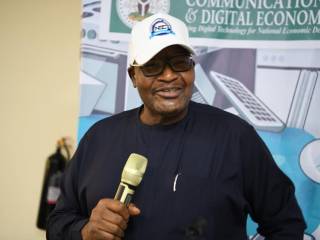Danbatta stated this while addressing a world Press Conference organized by the Commission in commemoration of the 2021 World Consumer Rights Day (WCRD) held virtually in Abuja on Monday, March 15, 2021, during which he also unveiled a Telecoms Consumer Handbook.
The new Consumer Handbook, produced by the NCC in collaboration with the Industry Consumers Advisory Forum (ICAF), is a compendium of consumer information materials put together to enhance consumer education and protection.
Addressing the theme of the WCRD 2021, “Tackling Plastic Pollution,” within the context of NCC’s activities, Danbatta said the Commission had drafted the Nigerian Communications Industry E-Waste Regulations in 2018 with the objective to manage e-waste.
He said the regulation aims to promote reuse, recycling and other forms of recovery; improve environmental management system of operators in the telecom industry; and reduce greenhouse emissions as well as enhance sustainable development efforts.
The EVC said while the NCC is concluding plans to issue the regulation on e-waste, it was mindful of the fact that many Information and Communication technology (ICT) and telecom devices have substantial plastic components, whose waste materials could worsen plastic pollution.
“In other words, we reckon that improper disposal of such disused ICT-plastic embedded products have grave implications on public health, and especially in achieving Goals 11, 12 and 13 of the Sustainable Development Goals (SDGs) 2030.
"These goals speak to the imperative of adhering to practices that enhance Sustainable Cities and Communities, Responsible Consumption and Production; as well as Climate Action respectively,” he said.
In the same vein, Danbatta spoke about the NCC’s collaboration with the Office of the National Security Adviser (ONSA) and other relevant government agencies to inaugurate a committee to implement Mobile Devices Management Systems (DMS).
This initiative is designed as a Public-Private Partnership aimed at combating the proliferation of fake, counterfeit, substandard and cloned communication devices in the telecommunications industry. He said the expected result of the initiative is that, only genuine materials malleable to enduring usage are available for consumer use.
He said the Commission has also diligently implemented a strict type-approval process that ensures all equipment used in the telecommunications industry are of acceptable standards, both for the good of the consumers and for the preservation of our environment.
“Our efforts on tackling electronic waste in Nigeria and some other proactive regulatory initiatives of the Commission tell the story of a shared vision for a satisfied consumer,” he said, while also speaking on other far-reaching initiatives for consumer information, protection and education.
Danabatta stated that the Commission would explore avenues for strategic collaboration with relevant government agencies to ensure a coordinated approach to the challenges of sub-standard equipment and e-waste in the country.
Signed:
Dr. Ikechukwu Adinde
Director, Public Affairs
March 18, 2021

